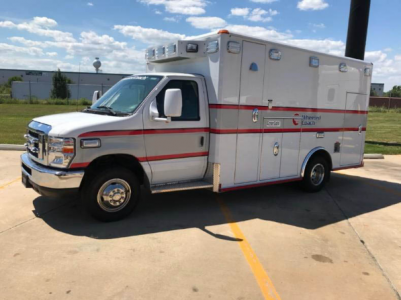I wonder what a police officer would think about some guy parked on the side of the road or in a, say Walmart, parking lot idling his motor and inside working on a lathe.
California plates, they look for drugs, there aren’t any, so I wonder if there’s any problem there?
I was thinking more parked in front of a business or residential area. Walmart parking lot is a lot less likely to be an issue.
If you saw a van parked outside your house with the engine running I'm sure your first thought would be, hmm wonder if he has a lathe in there

but a lot of people might wonder if it is somebody up to no good, casing the neighborhood, getaway van for a home invasion etc. People get paranoid, and call the police for some rinkydink stuff, like a neighbor running a lathe in his garage. Of course you aren't breaking the law and you might even get a police officer who was into it and get a good conversation out of the encounter, find out the best local coffee place.
An old box style ambulance would be a good candidate for conversion. They are usually fairly cheap, most are diesel, have a beefy electrical system, and good interior space. Many also have external compartments which could be good for material storage, or for mounting a generator if you choose to go that way. Not as incognito as a plain white van, but they look like a working vehicle so less likely to attract negative attention if seen parked with activity inside. Depending on the prior owner many are well maintained, although they can have been run hard, quick starts from cold to 60mph and often extended idling.
One downside, having worked on ambulances if you get one gut the patient compartment and use more bleach than you have ever used before to clean it out.
Something like this

Not to distract but let me offer you another option to make chips after class.
Sherline lathe 30lbs, and you could fit one with tooling into a suitcase. Maybe take up small engine building or clock making. You can take it as checked luggage on a plane and use it in the motel.
Sherline

 but a lot of people might wonder if it is somebody up to no good, casing the neighborhood, getaway van for a home invasion etc. People get paranoid, and call the police for some rinkydink stuff, like a neighbor running a lathe in his garage. Of course you aren't breaking the law and you might even get a police officer who was into it and get a good conversation out of the encounter, find out the best local coffee place.
but a lot of people might wonder if it is somebody up to no good, casing the neighborhood, getaway van for a home invasion etc. People get paranoid, and call the police for some rinkydink stuff, like a neighbor running a lathe in his garage. Of course you aren't breaking the law and you might even get a police officer who was into it and get a good conversation out of the encounter, find out the best local coffee place.
